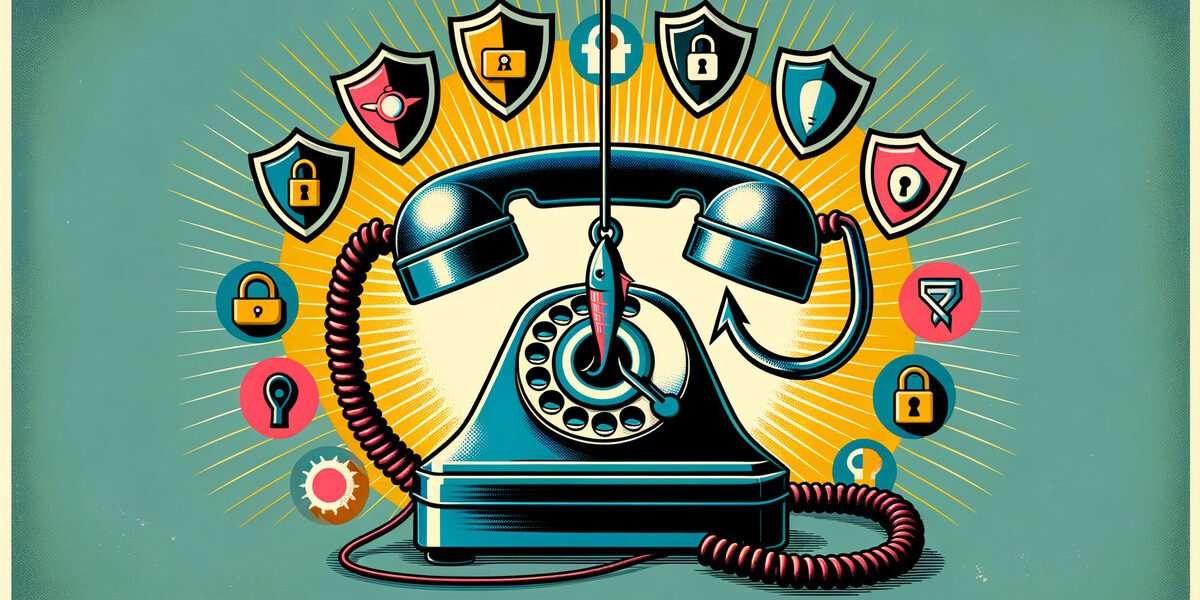In today’s digital landscape, cybercriminals are constantly evolving their tactics to exploit vulnerabilities and deceive unsuspecting individuals. One such method is vishing, or voice phishing, a sophisticated form of attack where fraudsters use phone calls to extract sensitive information or money from their victims. Vishing combines the tactics of traditional phishing with the personal touch of a phone call, making it a potent threat. This article provides a comprehensive guide on vishing attack prevention, offering valuable tips to safeguard yourself from these malicious schemes.
Understanding Vishing
Vishing, short for voice phishing, involves cybercriminals calling targets and posing as trusted entities such as banks, government agencies, or tech support. These attackers use social engineering techniques to manipulate individuals into divulging confidential information like Social Security numbers, credit card details, or login credentials. Unlike email phishing, vishing adds a layer of urgency and authenticity, making it harder for victims to detect the scam.
Common Vishing Scenarios
- Bank Fraud Alerts:
Attackers impersonate bank representatives, warning about suspicious activity on your account and asking for verification details.
- Government Impersonation:
Scammers pose as IRS or other government officials, threatening legal action unless personal information is provided.
- Tech Support Scams:
Fraudsters claim to be from tech companies like Microsoft or Apple, alerting you to supposed viruses on your computer and requesting remote access.
- Lottery or Prize Scams:
Callers inform you of winning a lottery or prize, but require you to pay a fee or provide personal details to claim it.
Tips for Vishing Attack Prevention
- Be Skeptical of Unsolicited Calls
Always be cautious when receiving unsolicited calls, especially from unknown numbers. Legitimate organizations rarely ask for sensitive information over the phone. If you receive such a call, hang up and contact the organization directly using a verified phone number.
- Do Not Share Personal Information
Never share personal or financial information over the phone unless you initiated the call and are certain of the recipient’s identity. This includes Social Security numbers, credit card details, and account passwords.
- Verify the Caller’s Identity
If a caller claims to be from a reputable organization, ask for their name, department, and a callback number. Verify these details by contacting the organization through their official contact channels. Most legitimate businesses will understand your caution.
- Use Caller ID and Call Blocking
Utilize caller ID to screen incoming calls. Be wary of numbers that appear suspicious or unfamiliar. Consider using call-blocking apps or services provided by your phone carrier to filter out potential vishing calls.
- Educate Yourself and Others
Stay informed about the latest vishing tactics and share this knowledge with friends and family. Awareness is a powerful tool in preventing vishing attacks. Familiarize yourself with common scam scenarios and warning signs.
- Set Up Two-Factor Authentication (2FA)
Enhance the security of your online accounts by enabling two-factor authentication. This adds an extra layer of protection, making it harder for attackers to gain access even if they obtain your login credentials.
- Monitor Your Accounts Regularly
Regularly check your bank statements and credit reports for any unusual activity. Promptly report any suspicious transactions to your bank or financial institution.
- Record and Report Suspicious Calls
If you receive a vishing call, try to record it and note any details about the caller. Report the incident to relevant authorities, such as the Federal Trade Commission (FTC) in the United States, and provide them with the information you’ve gathered.
- Use a Virtual Private Network (VPN)
When making online transactions or accessing sensitive information, use a VPN to encrypt your data. This adds a layer of security, protecting your information from being intercepted by cybercriminals.
- Implement Strong, Unique Passwords
Ensure your passwords are strong and unique for each of your accounts. Use a combination of letters, numbers, and special characters, and avoid using easily guessable information like birthdays or common words.
Responding to a Vishing Attack
If you suspect you’ve fallen victim to a vishing attack, take immediate action to mitigate the damage:
- Change Affected Passwords:
Immediately change passwords for any accounts that may have been compromised.
- Notify Relevant Institutions:
Contact your bank, credit card companies, and other relevant institutions to inform them of the potential breach.
- Monitor for Fraudulent Activity:
Keep a close watch on your financial accounts for any signs of unauthorized transactions.
- Report the Incident:
Report the vishing attempt to local authorities, the FTC, and any other relevant organizations.
Staying Ahead of Vishing Attacks
Cybercriminals are continually refining their tactics, making it crucial to stay vigilant and proactive. Here are some advanced strategies to further protect yourself from vishing:
- Voice Biometrics:
Some banks and financial institutions offer voice biometric services that can recognize your voice and help authenticate calls. Enroll in these services if available.
- Robocall Mitigation:
Utilize robocall mitigation services provided by your phone carrier to reduce the number of automated calls you receive.
- Phishing Simulations:
Participate in phishing and vishing simulation programs offered by your employer or cybersecurity firms to practice identifying and responding to potential scams.
- Regular Security Training:
Engage in regular security awareness training to stay updated on the latest threats and best practices for protecting yourself from cyberattacks.
Conclusion
Vishing attacks are a serious threat in the digital age, combining the impersonality of technology with the trust often placed in voice communication. By staying informed, skeptical, and proactive, you can effectively protect yourself from these sophisticated scams. Remember to be cautious with unsolicited calls, verify caller identities, and never share sensitive information over the phone. By adopting these practices and encouraging others to do the same, you can significantly reduce the risk of falling victim to vishing attacks and safeguard your personal information. Stay vigilant and take control of your phone security today.
